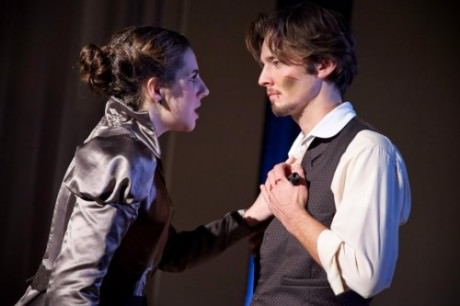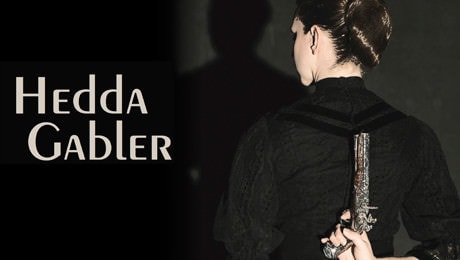Dramatist Henrik Ibsen’s works are filled with strong women and insights into the human condition. Hedda Gabler, one of the idiomatic Ibsen’s most noted and popular productions, is no exception. Originally published in 1890, this timeless, tragic masterpiece can be interpreted as a reflection on the purposeless life endured by women of that time, and the social conduct and behavior which limited their activities. The soul of Hedda Gabler illuminates the protest against the double standards that exist in society.

Celebrating 75 years, The Catholic University of America’s Department of Drama kicks off it’s five play 2012-2013 season with the world drama classic, Hedda Gabler, adapted by Michael Meyer, and directed by the CUA head of the MFA Directing program, Eleanor Holdridge. Holdridge, has also had a busy year directing professional theater productions in D.C including: Body Awareness,(Theater J) Double Indemnity (Round House Theatre), and The Gaming Table (Folger Theatre).
Hedda Gabler, the daughter of a Norwegian aristocratic General, is a “boring herself to death” lost in a loveless marriage, trapped in a compromised world, and has anxiety about the way in which society as a whole perceives her. Although she is recently married, and is Hedda Tesman – as personified by the title name – she is more her father’s daughter than her husband’s wife. The struggle between the inward needs of all of the characters in the play, and the demands of their social environments, are expressed in this multi-layered, moody drama. Yet, at it’s core, the anti-heroine Hedda Gabler is still the tale of one woman used to luxury who wants more Through a series of of personal campaigns for control and dominance, Hedda will plot, lie, and cheat her way through life to escape her own boredom, no matter the cost.
Luciana Stecconi’s splendid scene design set the tone for the evening, creating a drawing room of monied, establishment and classic, elegance. The towering double set of floor to ceiling, windowed doors were the dramatic highlight, providing a gorgeous scenic view through the frames to the outside and outdoors exterior. The fresh, polished look of the interior was stately and refined, framed with a gold chandelier center piece and three white cala lily bouquets and two other flower arrangements adorning the room. The traditional living room furniture is minimal accented by a black baby grand piano to the left rear of the room.
Every aspect of the technical production of Hedda Gabler is first rate. The lighting and sound design guided by two recent Helen Hayes Award recipients Andrew F. Griffin (King Lear at Synthetic Theater) and Christopher Baine (A Bright New Boise at Woolly Mammoth Theatre Company) nurture the production for a penetrating, dreamy effect. The lighting is delicious. The mystery of the shadowy silhouettes, and the sunlight beauty of the morning gaze was elusive but equally inviting. The exquisite dresses worn by Hedda and supplied by Helen Hayes Award recipient Costume Designer Kendra Rai are defining and look expensive; and, the other detailed, period appropriate wardrobe is noteworthy.
Hedda Gabler is flummoxed by the issues of uneven acting and direction choices. The uninspired blocking and the constrained acting performances lacked the intensity, grace, and the creative passion of the technical merits. This Hedda Gabler was presented as if the back story, mental health, and emotional state of the characters were unknown. When Hedda addressed the audience a few times in soliloquy, those moments are out of rhythm with the tone of the rest of play. The shift felt awkward and clumsily handled, as opposed to crafting a revealing, personal insight of this dynamic personality.
Nothing is more tedious and unimaginative than the continued delivery of emotional, motivated dialogue delivered sitting down. When this happened, most of the tension was drained and any heightened energy or metaphorical context to be gained from these scenes were lost. This production was replete with scenes being played out, sitting down on the couch, chair, and footstool. Time after time, the sit down delivery of the conversations fell flat, and were measured and even toned with one another.
At this performance, Amy Leigh Horan (Hedda) seemed uncomfortable with the darker aspects of Hedda – I wasn’t clear who her Hedda was – and this may have just been a directorial choice. The depth of manipulation, secrets, and internal self hate that occurs with Ibsen’s controversial character went virtually unrecognized – perhaps making the ending even more shocking, but as it is equally misunderstood with this surface performance.
Nina Marti provided a convincing emotional arc for her character as Hedda’s rival, the nurturing Mrs. Elvsted. Marti was a solid performer creating as much drama in the pauses and moments that she doesn’t speak, as those where her character’s loneliness, emotional frailty, and anxiousness punctuates a scene. There were a few shimmering moments from Patrick Finannery (Eilert Loevborg) as Hedda’s old love interest and new intellectual rival to her husband; and, Chris Daileader is substantive and consistently good as the lecherous Judge Brack. Still, there was little chemistry or rhythm among the relationships within the ensemble. Brendan McMahon (George Tesman) as Hedda’s husband, finds his voice in his reaction during the the scene where Hedda burns Loevborg’s manuscript.
Ibsen’s plot of frustrated ambition is clever, compelling, and fascinating. Hedda Gabler’s presence dominates the stage, as she is the only character in the play that never physically leaves the home. As written, Hedda is truly this complex, enigmatic character who is alluring yet wicked. Her sinister manipulations ultimately trapped her beyond her ability to escape, and her ideal of freedom, courage and beauty turns into a loathsome reality.
Running Time: Two hours and 30 minutes, with one intermission.
Hedda Gabler played through October 14, 2012 at The Catholic University’s Hartke Theatre – 3801 Harewood Road, NE, in Washington, DC. For future shows and tickets, call the box office at (202) 319-4000, or purchase them online.



